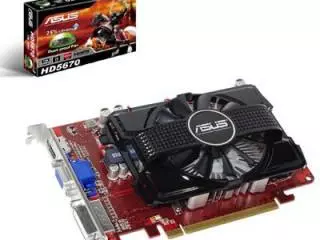GeForce 920M vs Radeon HD 5670
When comparing GeForce 920M and Radeon HD 5670, we look primarily at benchmarks and game tests. But it is not only about the numbers. Often you can find third-party models with higher clock speeds, better cooling, or a customizable RGB lighting. Not all of them will have all the features you need. Another thing to consider is the port selection. Most graphics cards have at least one DisplayPort and HDMI interface, but some monitors require DVI. Before you buy, check the TDP of the graphics card - this characteristic will help you estimate the consumption of the graphics card. You may even have to upgrade your PSU to meet its requirements. An important factor when choosing between GeForce 920M and Radeon HD 5670 is the price. Does the additional cost justify the performance hit? Our comparison should help you make the right decision.
GeForce 920M is a Laptop Graphics Card
Note: GeForce 920M is only used in laptop graphics. It has lower GPU clock speed compared to the desktop variant, which results in lower power consumption, but also 10-30% lower gaming performance. Check available laptop models with GeForce 920M here:
Main Specs
GeForce 920M
Radeon HD 5670
Power consumption (TDP)
33 Watt
64 Watt
Interface
PCIe 3.0 x8
PCIe 2.0 x16
Supplementary power connectors
None
Memory type
DDR3
GDDR5
Maximum RAM amount
4 GB
1 GB
Display Connectors
No outputs
1x DVI, 1x HDMI, 1x VGA
Check Price
Check Price
Radeon HD 5670 has 93% more power consumption, than GeForce 920M.
GeForce 920M is connected by PCIe 3.0 x8, and Radeon HD 5670 uses PCIe 2.0 x16 interface.
GeForce 920M has 3 GB more memory, than Radeon HD 5670.
GeForce 920M is used in Laptops, and Radeon HD 5670 - in Desktops.
GeForce 920M is build with Kepler architecture, and Radeon HD 5670 - with Terascale 2.
Core clock speed of GeForce 920M is 179 MHz higher, than Radeon HD 5670.
GeForce 920M is manufactured by 28 nm process technology, and Radeon HD 5670 - by 40 nm process technology.
Memory clock speed of GeForce 920M is 800 MHz higher, than Radeon HD 5670.
Game benchmarks
Assassin's Creed Odyssey
Battlefield 5
Call of Duty: Warzone
Counter-Strike: Global Offensive
Cyberpunk 2077
Dota 2
Far Cry 5
Fortnite
Forza Horizon 4
Grand Theft Auto V
Metro Exodus
Minecraft
PLAYERUNKNOWN'S BATTLEGROUNDS
Red Dead Redemption 2
The Witcher 3: Wild Hunt
World of Tanks
high / 1080p
0−1
0−1
QHD / 1440p
0−1
0−1
low / 720p
1−2
1−2
medium / 1080p
0−1
0−1
GeForce 920M and Radeon HD 5670 have the same average FPS in Assassin's Creed Odyssey.
QHD / 1440p
0−1
0−1
low / 720p
0−1
0−1
low / 768p
50−55
50−55
high / 1080p
45−50
45−50
QHD / 1440p
0−1
0−1
GeForce 920M and Radeon HD 5670 have the same average FPS in Call of Duty: Warzone.
low / 768p
60−65
60−65
medium / 768p
27−30
27−30
ultra / 1080p
7−8
7−8
high / 768p
16−18
16−18
GeForce 920M and Radeon HD 5670 have the same average FPS in Counter-Strike: Global Offensive.
low / 768p
70−75
70−75
ultra / 1080p
0−1
0−1
medium / 1080p
45−50
45−50
GeForce 920M and Radeon HD 5670 have the same average FPS in Cyberpunk 2077.
low / 768p
45−50
45−50
medium / 768p
10−11
10−11
ultra / 1080p
0−1
0−1
GeForce 920M and Radeon HD 5670 have the same average FPS in Dota 2.
low / 720p
0−1
0−1
low / 720p
21−24
21−24
medium / 1080p
0−1
0−1
GeForce 920M and Radeon HD 5670 have the same average FPS in Fortnite.
high / 1080p
0−1
0−1
QHD / 1440p
0−1
0−1
low / 720p
0−1
0−1
medium / 1080p
0−1
0−1
low / 768p
18−20
18−20
high / 1080p
0−1
0−1
QHD / 1440p
0−1
0−1
medium / 720p
12−14
12−14
GeForce 920M and Radeon HD 5670 have the same average FPS in Grand Theft Auto V.
low / 720p
0−1
0−1
low / 768p
75−80
75−80
high / 1080p
27−30
27−30
GeForce 920M and Radeon HD 5670 have the same average FPS in Minecraft.
low / 720p
8−9
8−9
GeForce 920M and Radeon HD 5670 have the same average FPS in PLAYERUNKNOWN'S BATTLEGROUNDS.
low / 720p
0−1
0−1
low / 768p
0−1
0−1
low / 768p
45−50
45−50
medium / 768p
14−16
14−16
ultra / 1080p
0−1
0−1
high / 768p
12−14
12−14
GeForce 920M and Radeon HD 5670 have the same average FPS in World of Tanks.
Full Specs
GeForce 920M
Radeon HD 5670
Architecture
Kepler
Terascale 2
Code name
N16V-GM-S
Redwood
Type
Laptop
Desktop
Release date
27 January 2015
14 January 2010
Pipelines
384
400
Core clock speed
954 MHz
775 MHz
Transistor count
915 million
627 million
Manufacturing process technology
28 nm
40 nm
Texture fill rate
30.53
15.50
Floating-point performance
297.6 gflops
620.0 gflops
Length
168 mm
Memory bus width
64 Bit
128 Bit
Memory clock speed
1800 MHz
1000 MHz
Memory bandwidth
14.4 GB/s
64 GB/s
Shared memory
-
DirectX
12 (11_0)
11.2 (11_0)
Shader Model
5.1
5.0
OpenGL
4.5
4.4
OpenCL
1.2
1.2
Vulkan
1.1.126
N/A
CUDA
+
Bus support
PCI Express 3.0
Bitcoin / BTC (SHA256)
40 Mh/s
Optimus
+
GPU Boost
2.0
GameWorks
+
Check Price
Check Price

